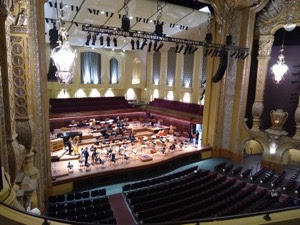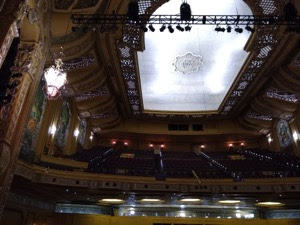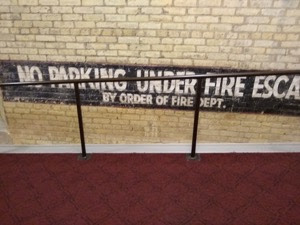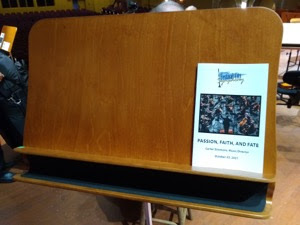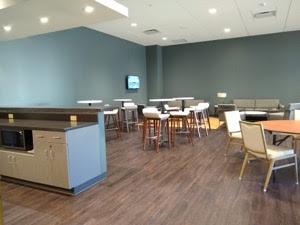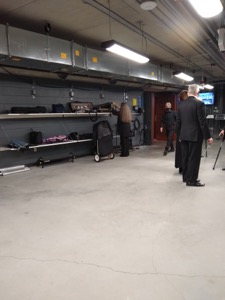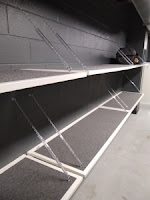I recently played a concert where we were asked to wear clothing that represented our culture or heritage, and in lieu of that, concert black or something colorful. This was a Juneteenth concert, so I understood the sentiment.
However, in my case, I genuinely didn't know what to do with that.
What am I?
I am half Jewish, but not in a way that plays out beyond attending weddings and funerals. It's out there, but it's not mine. There's Hungarian and Latvian stuff in my family tree, but not taught to me by anyone I know. There's German heritage on my mom's side that includes my great-great-grandparents here in Milwaukee coming from Germany, but I can't tell you specifics. I know when Ian and I visited Berlin, we were amused to find the food in the hostel to be essentially the same thing we'd get served at my grandma's. Occasionally when we eat a standard looking dinner with meat, potatoes, and a vegetable we'll now call it ethnic food.
There is nothing in that mix that seems appropriate to don as "my heritage." I certainly wasn't going to show up to the concert in a dirndl.
Culturally, I'm just an American. More specifically, a Midwesterner. Which means whatever I'm wearing on any given day counts as cultural attire. That's only (potentially) interesting if I'm somewhere other than the Midwest. I look a bit out of place in New York. I know I stood out in India. But in Milwaukee? Being American in America is just the air we breathe. Not much to see.
There are different ways to approach heritage. For me, it's only of interest if it's directly personal. I love telling my kids stories about my parents and grandparents, and sharing any stories they passed down to me about people they were related to. I'm curious about connections that feel alive. Tracing back family trees beyond a point where no one has stories to share doesn't generally hold my attention.
My husband is someone who does genealogical research and has traced back his family tree pretty thoroughly. He's stopped at graveyards to locate ancestors, and looked through census records. His heritage includes Germans on one side, and Native Americans on another. When people ask where he's from, he usually says the West Coast, and if they press it, he claims to be ethnically Californian, and if they push it further he can trace family back to Oklahoma from the Trail of Tears. Does he consider this his heritage in the sense that he's been handed down traditions or lore? No. He grew up in Oregon, but he's lived in the Midwest at this point longer than he was there. Researching his family tree has more to do with his appreciation of history in general, and he wants to share with our kids their place in it.
I understand that on one level, but for myself, once you search back enough distance that it's reduced to data rather than stories, it doesn't belong to me more than to anyone else.
I also believe we shouldn't be chained to people in the past by accident of birth. I happen to have a lovely family that I enjoy being connected to. But I don't get to claim credit for any of their accomplishments merely by association. Just as I don't have to feel guilt for things my ancestors did. It would be really cool if I came from a family of luthiers that went back generations, and I could trace my skills to specific people in the past, but I would still have to make my own mark. And if someone in my family tree was awful, that's not on me. I have a responsibility to do the right thing now, regardless of the past or where I came from.
I'm sure I would find it distressing if I found out I had ancestors that owned slaves, but primarily because the concept itself is horrible overall. My husband did find slaveholders in his family tree, but those particular relatives were Native American. That one is complicated to process.
In my home growing up, we had rather loose traditions. There was just stuff we did, but it wasn't imbued with any sense of obligation to the past. We had a secular kind of Christmas because Christmas is fun. I know my dad was never comfortable with a Christmas tree in the house, but he understood why that was a nice thing for his children. I asked him once why he still referred to himself as Jewish since he wasn't practicing, and he said you can't be the first person to turn your back on thousands of years of an unbroken lineage without feeling the weight of it behind you.
Ian and I have raised our children in the same general way we knew growing up. We do things that have become part of the American landscape like secular Christmas and Easter. We love costumes at Halloween. We like repeating the same menu every Thanksgiving and crossing our fingers over whether or not the orange jello will set or be served as goo. But many of those activities that we consider traditional are evolving as our kids have become adults. I like that we do things because we choose to.
In my mind, having those moments be chosen rather than dictated by a particular heritage makes them more special, not less. I remember several years ago when I was suffering through something complicated, and told my family that we could forego anything to do with Mother's Day that year. It wasn't worth the hassle and I didn't feel particularly deserving. But then that Sunday morning rolled around, and there was Quinn at the end of my bed with a breakfast tray and the annual small bouquet of lilacs. I expressed surprise since I had said it wasn't necessary, and she told me it "felt important." I still tear up when I think about that.
I find other people's dedication to heritage anywhere from charming to perplexing. I understand why if a person had a religious or cultural tradition that they loved and was handed down over generations why they would continue it. I also appreciate wanting to feel a connection to places and cultures that were stolen from someone. Things that provide inspiration and comfort are important. But tradition isn't synonymous with good, and I can think of many examples of groups or rituals that don't add to the betterment of the world. When I see people clinging to symbols of the Civil War and defending it as heritage, while willfully ignoring vile parts of that history, I am anywhere from confused to appalled.
Weddings are a big moment for heritage. I remember planning my wedding and expressing to my dad that I wasn't sure what to draw on, since we didn't have anything we followed that came with a particular set of expectations. He said I had all of human history and culture to choose from and to pick what appealed to me, but that's not really true. I don't remember public discussions about cultural
appropriation back in the 90s, but even then I knew not to
"jump a broom" at my wedding just because I thought it looked neat. Traditions
are supposed to mean something, and treating other people's heritage like a grab bag is disrespectful.
When my brother married a woman from India, they had wedding ceremonies in both Ohio and Calcutta. It was amusing to see my sister-in-law express a fascination with whatever was traditional to do here, and enthusiasm to do any of it, but my brother preferred to be different since few of those traditions meant anything to him. Then in India, I watched the reverse, where my sister-in-law rolled her eyes at many elements expected of her at a traditional ceremony and my brother was all in.
Other people's heritage always looks more interesting. When I lived in Mexico for a summer back in college, I loved the culture there. And one of the teachers at the language school I was attending told me that Americans were the most interesting of all the international students to ask where they were from, because there was always more than one answer. Only the Americans consistently claimed multiple sets of heritage. When asked where they were from, they always said "America" first, and immediately followed it up with whatever ancestry they knew, such as German or Jamaican or Korean.
Ultimately, I think people should feel free to drop whatever traditions from their heritage that don't serve them well in this time and place, and to embrace whatever parts give them security and purpose.
I asked my youngest daughter during the intermission of that Juneteenth concert what she felt about the question of heritage as it relates to our family. She agreed that identifying as anything much beyond being an American or a Midwesterner was a stretch. She liked that we can be creative about what we call tradition in our home. She feels loved and supported and doesn't need to look to the past for that. What we've made for ourselves is enough.
So what did I finally choose to wear? A top handed down from my mom that she made decades ago. It's fun, it's colorful, it's unique, and my mom made it. Since she also made me, I can't think of a better way to represent my heritage than that.




